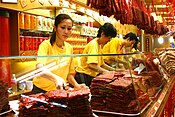Bakkwa
 Chinese bakkwa made from pork | |
| Alternative names | Rougan (bak kua, bak gua) |
|---|---|
| Place of origin | China |
| Region or state | Fujian |
| Main ingredients | Dried meat |
| Bakkwa | |||||||||||||||||
|---|---|---|---|---|---|---|---|---|---|---|---|---|---|---|---|---|---|
| Traditional Chinese | 肉乾 | ||||||||||||||||
| Simplified Chinese | 肉干 | ||||||||||||||||
| Literal meaning | dried meat | ||||||||||||||||
| |||||||||||||||||
Bakkwa, also known as rougan (肉干), is a Chinese salty-sweet dried meat product similar to jerky. It originated from the Fujian province in China where it is considered a Hokkien delicacy.[1]
Bakkwa is made with a meat preservation and preparation technique originating from China.[2] The general method for production have remained virtually unchanged throughout the centuries, but the techniques have been gradually improved.[2] It is traditionally made of pork (although it can instead be made of beef or mutton), which is prepared with spices, sugar, salt and soy sauce, while dried on racks at around 50 to 60 °C.[3]
Nowadays, products with a softer texture, lighter colour and less sugar are preferred.[2] The bakkwa products with the higher water content, thus having softer texture and lower sugar content are generally known as the shafu type of bakkwa.[2] Nevertheless, shafu can have similar shelf life as other types of bakkwa.[2] The meat is most commonly served plain and in square-shaped slices in the form of flat thin sheets.
Bakkwa is immensely popular in Singapore and Malaysia where it is usually eaten during Chinese New Year. When Chinese immigrants brought this delicacy over to Singapore and Malaysia, it began to take on local characteristics. A notable example lies in the preparation of bakkwa, where the meat once still being air-dried is instead grilled over charcoal.[1] This imparts a smokier flavour to the meat. The Singaporean and Malaysian versions of bakkwa are also sweeter than its mainland China counterpart with many different variations adapted to suit the local palette such as chilli bakkwa.[1]
-
Different kinds of bakkwa on display, Hong Kong
-
Bakkwa at a Bee Cheng Hiang shop in Singapore
See also
References
- ^ a b c Guay Ee Ling (2010), National Library Singapore, Heritage and Culture, "Bak kwa".
- ^ a b c d e Leistner, Lothar (1999). Lund, Barbara M.; et al. (eds.). The microbiological safety and quality of food: Volume 1. Gaithersburg: Aspen Publishers. p. 306. ISBN 978-0-8342-1323-4.
- ^ International Commission on Microbiological Specifications for Foods, ed. (2005). Micro-organisms in foods 6: Microbal ecology of food commodities (2nd ed.). New York: Kluwer Academic / Plenum Publishers. p. 68. ISBN 978-0-306-48675-3.




